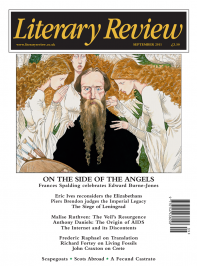Jonathan Keates
Unlucky Voice
The Castrato and His Wife
By Helen Berry
Oxford University Press 288pp £16.99
The ascendancy of the castrato singer constitutes one of the more bizarre aspects of European cultural history during the seventeenth and eighteenth centuries. From 1650 to 1800 the most sought-after vocal stars in court theatres, public opera houses and Roman Catholic chapels and churches were gelded Italian males, whose parents had subjected them, at an early age, to the removal of their testicles as a guarantee of a secure and profitable future career. The operation was a gamble, as most operations tend to be, and not every little boy with a fine singing voice would end up swanning around in Roman armour on the stages of Milan, Mantua, Munich or Mannheim, sending grand duchesses and prince-bishops into swooning paroxysms of ecstasy with his cadenzas and roulades. Yet if all went well, the rewards for a poor peasant lad from some squalid mountain hamlet in Calabria or the Abruzzi could surpass his most riotous fantasies.
Giusto Ferdinando Tenducci’s fortunes as a castrato, to start with at any rate, looked promising enough. The son of a household servant to the governor of the Tuscan town of Monte San Savino, he was gelded at the age of twelve by a

Sign Up to our newsletter
Receive free articles, highlights from the archive, news, details of prizes, and much more.@Lit_Review
Follow Literary Review on Twitter
Twitter Feed
It wasn’t until 1825 that Pepys’s diary became available for the first time. How it was eventually decrypted and published is a story of subterfuge and duplicity.
Kate Loveman tells the tale.
Kate Loveman - Publishing Pepys
Kate Loveman: Publishing Pepys
literaryreview.co.uk
Arthur Christopher Benson was a pillar of the Edwardian establishment. He was supremely well connected. As his newly published diaries reveal, he was also riotously indiscreet.
Piers Brendon compares Benson’s journals to others from the 20th century.
Piers Brendon - Land of Dopes & Tories
Piers Brendon: Land of Dopes & Tories - The Benson Diaries: Selections from the Diary of Arthur Christopher Benson by Eamon Duffy & Ronald Hyam (edd)
literaryreview.co.uk
Of the siblings Gwen and Augustus John, it is Augustus who has commanded most attention from collectors and connoisseurs.
Was he really the finer artist, asks Tanya Harrod, or is it time Gwen emerged from her brother’s shadow?
Tanya Harrod - Cut from the Same Canvas
Tanya Harrod: Cut from the Same Canvas - Artists, Siblings, Visionaries: The Lives and Loves of Gwen and Augustus John by Judith Mackrell
literaryreview.co.uk